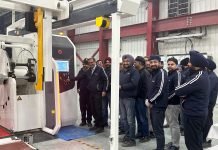
A roundtable held on 10 April 2024 at the Taj Mansingh in Delhi discussed the future and the road ahead of plastic packaging in India in the backdrop of the EPR norms, the Ottawa plastic conference, recyclability, the need for advanced technologies and a national standard for scientific estimation to determine recycled content, design innovations for a circular economy and keeping the planet clean.
At the core of the meeting was the release of a report on recyclability prepared by the Plastic Packaging Research and Development Centre (PPRDC), a non-profit that liaisons with the packaging industry, reputed institutes, and research centers to promote sustainable solutions in flexible packaging.
Releasing the report on ‘Quantitative and Qualitative Determination of Recycled PE Content in Post-Consumer Recycled Blends’, Ashok Chaturvedi, chairman and managing director of multinational flexible packaging and solutions company UFlex, stressed the importance of recyclability of post-consumer packaging waste in a circular economy and the need to keep the planet clean.
In addition to the launch of the study report at the roundtable, the fourth in its series, government and industry representatives discussed a wide range of topics including the scope and status of EPR implementation in India and the challenges faced by producers, brand owners, and importers in complying with EPR guidelines.
Chaturvedi lauded the government’s plastic waste management (PWM) and extended producer responsibility (EPR) regulations, which he said are expected to transform India’s waste management ecosystem and accelerate the pivot to sustainable development and a circular economy.
At the same time, he, along with other speakers at the conference, stressed the need to measure recycled content in packaging accurately and to avoid inconsistencies in EPR reporting.
“The study report by PPRDC, supported by CIPET (Central Institute of Petrochemicals Engineering and Technology) and BIS (Bureau of Indian Standards), is a step in the right direction, which proposes the development of a standardized measurement of recycled PE content in packaging by producers, importers, and brand owners to deliver on their individual and industry EPR objectives,” Chaturvedi said.
According to Chaturvedi, sustainability is the cornerstone of UFlex’s corporate strategy. “As a global leader in packaging, we have made significant investments in recycling technologies to keep plastic in the economy and out of the environment. We recycle nearly 30,000 metric tons of multi-layer plastic (MLP) waste annually across India, Poland, and Mexico. The goal is to reach 100,000 MT of recycling annually by building additional global recycling facilities.”
The School for Advanced Research in Petrochemicals (SARP) – Laboratory for Advanced Research in Polymeric Materials (LARPM) at the Central Institute of Petrochemicals Engineering & Technology (CIPET) in Bhubaneswar, recently conducted a study explaining a method of determining rPE content in packaging materials.
The study recommends FTIR spectroscopy and DSC-based thermo-analytical techniques to develop a national standard or operating/audit process to assess and regulate the recycled content of PCR plastic packaging. This helps discourage practices such as green-washing and waste fraud that diminish circularity and erode public trust in plastic recycling.
This report builds on previous findings of SARP-LARPM, CIPET, in collaboration with the Foundation for Innovation & Technology Transfer, IIT-Delhi, for the method of determination and estimation of mechanically recycled PET content in packaging materials. Earlier, these institutes recommended using a UV-Vis Spectrophotometer to accurately predict the recycled content in v-PET/rPET composites.
Other speakers at the event included Deepak Mishra, joint secretary at the department of chemicals and petrochemicals, Meenal Passi, head – petroleum, coal and related products department (PCD), Bureau of Indian Standards (BIS), Shishir Sinha, director general, CIPET, Smita Mohanty, principal director, CIPET: School for Advanced Research in Petrochemicals – Laboratory for Advanced Research in Polymeric Materials, Mihir Banerji, secretary general of PPRDC, and Jeevraj Pillai, trustee of PPRDC.









